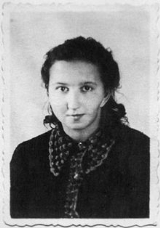
Danuta Siedzikówna
Encyclopedia
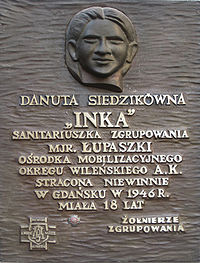
Wilenska Cavalry Brigade
Wilenska Cavalry Brigade was a unit of the Polish Army, created on 1 April 1937 out of the 3rd Independent Cavalry Brigade. Its headquarters were stationed in Wilno, with some regiments garrisoned in the neighboring towns....
of the Polish
Poland
Poland , officially the Republic of Poland , is a country in Central Europe bordered by Germany to the west; the Czech Republic and Slovakia to the south; Ukraine, Belarus and Lithuania to the east; and the Baltic Sea and Kaliningrad Oblast, a Russian exclave, to the north...
Home Army
Armia Krajowa
The Armia Krajowa , or Home Army, was the dominant Polish resistance movement in World War II German-occupied Poland. It was formed in February 1942 from the Związek Walki Zbrojnej . Over the next two years, it absorbed most other Polish underground forces...
. In 1946 she served with the Brigade's 1st Squadron in Poland's Pomorze
Pomerania
Pomerania is a historical region on the south shore of the Baltic Sea. Divided between Germany and Poland, it stretches roughly from the Recknitz River near Stralsund in the West, via the Oder River delta near Szczecin, to the mouth of the Vistula River near Gdańsk in the East...
(Pomerania) region.
Early life
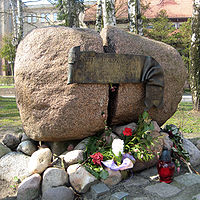
Olchówka, Podlaskie Voivodeship
Olchówka is a village in the administrative district of Gmina Narewka, within Hajnówka County, Podlaskie Voivodeship, in north-eastern Poland, close to the border with Belarus. It lies approximately north-east of Narewka, north-east of Hajnówka, and south-east of the regional capital...
/Guszczewina
Guszczewina
Guszczewina is a village in the administrative district of Gmina Narewka, within Hajnówka County, Podlaskie Voivodeship, in north-eastern Poland, close to the border with Belarus. It lies approximately east of Narewka, north-east of Hajnówka, and south-east of the regional capital Białystok.The...
, near Narewka
Narewka
Narewka is a village in Poland, in Podlaskie Voivodeship, Hajnówka County, Gmina Narewka. It is located near the border with Belarus. Many of the inhabitants belong to the Belarusian minority in Poland.The village has a Catholic and Orthodox churches...
, in the Bielsk Podlaski
Bielsk Podlaski
-Roads and Highways:Bielsk Podlaski is at the intersection of two National Road and a Voivodeship Road:* National Road 19 - Kuźnica Białystoka Border Crossing - Kuźnica - Białystok - Bielsk Podlaski - Siemiatycze - Międzyrzec Podlaski - Kock - Lubartów - Lublin - Kraśnik - Janów Lubelski - Nisko...
district. Her father, Wacław Siedzik was a forester
Forester
250px|thumb|right|Foresters of [[Southern University of Chile|UACh]] in the [[Valdivian forest]]s of San Pablo de Tregua, ChileA forester is a person who practices forestry, the science, art, and profession of managing forests. Foresters engage in a broad range of activities including timber...
who had been sent to Siberia under the Tsar for being involved in pro-Polish independence organizations. He came back to Poland in 1923. In 1940 he was arrested by the NKVD
NKVD
The People's Commissariat for Internal Affairs was the public and secret police organization of the Soviet Union that directly executed the rule of power of the Soviets, including political repression, during the era of Joseph Stalin....
and once again deported to Russia. In 1941 he joined Władysław Anders' Polish Army (died in Teheran in 1942). Her mother, Eugenia, née
NEE
NEE is a political protest group whose goal was to provide an alternative for voters who are unhappy with all political parties at hand in Belgium, where voting is compulsory.The NEE party was founded in 2005 in Antwerp...
Tymińskia Prus III coat of arms, was a member of the Home Army and was killed by the Gestapo
Gestapo
The Gestapo was the official secret police of Nazi Germany. Beginning on 20 April 1934, it was under the administration of the SS leader Heinrich Himmler in his position as Chief of German Police...
in September 1943. Danuta Siedzikówna grew up with her siblings, Wiesława (1927–2004) and Irena (1931? - 1978), in the forester's lodge near Olchówka
Olchówka, Podlaskie Voivodeship
Olchówka is a village in the administrative district of Gmina Narewka, within Hajnówka County, Podlaskie Voivodeship, in north-eastern Poland, close to the border with Belarus. It lies approximately north-east of Narewka, north-east of Hajnówka, and south-east of the regional capital...
(when were exiled Wacław they moved to Narewka), the girls attended grammar school in Narewka
Narewka
Narewka is a village in Poland, in Podlaskie Voivodeship, Hajnówka County, Gmina Narewka. It is located near the border with Belarus. Many of the inhabitants belong to the Belarusian minority in Poland.The village has a Catholic and Orthodox churches...
until 1939. During the Second World War, until 1943 all three girls studied in the Salesian Sisters School in Różanystok
Rózanystok
Różanystok is a village and former monastery in northeastern Poland, known regionally for both its ornate 18th-century minor basilica and its agricultural magnet school...
near Dąbrowa Białostocka.
Second World War and after
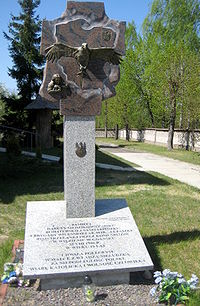
Gestapo
The Gestapo was the official secret police of Nazi Germany. Beginning on 20 April 1934, it was under the administration of the SS leader Heinrich Himmler in his position as Chief of German Police...
in Białystok, together with her sister Wiesława, Danuta joined the Home Army in late 1943 or early 1944. As part of the underground army's training she acquired medical skills.
After the Soviets took Białystok from the German Nazis, she started work as a clerk in the forest inspectorate in Hajnówka
Hajnówka
Hajnówka is a town and a powiat seat in north-eastern Poland with 21,583 inhabitants . It is a notable centre of Belarusian culture in Poland and one of the centres of Orthodox faith. It is also notable for its proximity to the Białowieża Forest, the biggest primaeval forest in Europe. It is the...
.
Together with other employees of the inspectorate she was arrested in June 1945 by NKWD and UB for collaboration with the anticommunist underground. She was liberated from a prison transport convoy by a patrol of a Wilno group of ex-Home Army partisans commanded by Stanisław Wołonciej "Konus", a subordinate of Zygmunt Szendzielarz
Zygmunt Szendzielarz
Zygmunt Szendzielarz was commander of the Polish 5th Wilno Home Army Brigade.-Early life:...
, "Łupaszko", who were operating in the area. "Konus" took the freed prisoners to "Łupaszko"'s camp where some of them, including Danuta, joined his group. Subsequently Siedzikówna served as a medical orderly in the "Konus" troop, and then in the squadron of lieutenant Jan Mazur, "Piast", and that of lieutenant Marian Płuciński, "Mścisław". For a short period of time her superior was also lieutenant Leon Beynar "Nowina", deputy of "Łupaszko", later known as "Paweł Jasienica" - a notable Polish historian and writer. During this time Danuta assumed pseudonym "Inka".
The "Łupaszko" brigade was dissolved in September 1945 and Danuta went back to work in the forest inspectorate in Miłomłyn in Ostróda County
Ostróda County
Ostróda County is a unit of territorial administration and local government in Warmian-Masurian Voivodeship, northern Poland. It came into being on January 1, 1999, as a result of the Polish local government reforms passed in 1998. Its administrative seat and largest town is Ostróda, which lies ...
under the name "Danuta Obuchowicz". However, the brigade was re-mobilized in response to Communist repressions in January 1946. In the early spring of 1946 Danuta came into contact with second lieutenant Zdzisław Badocha "Żelazny", the commander of one of Łupaszko's squadrons. Afer "Żelazny"'s death, the new commander, second lieutenant Olgierd Christa "Leszek", ordered Danuta to travel to Gdańsk
Gdansk
Gdańsk is a Polish city on the Baltic coast, at the centre of the country's fourth-largest metropolitan area.The city lies on the southern edge of Gdańsk Bay , in a conurbation with the city of Gdynia, spa town of Sopot, and suburban communities, which together form a metropolitan area called the...
in order to collect medical supplies.
She was arrested by the UB again on 20 July 1946, in Gdańsk. While in prison she was tortured and beaten but refused to give up the information on her contacts in the anti-communist underground and their meeting points.
Trial and death
She was charged with taking an active, violent part in an attack on functionaries of the UB and the Milicja ObywatelskaMilicja Obywatelska
Milicja Obywatelska was a state police institution in the People's Republic of Poland. It was created in 1944 by Soviet-sponsored PKWN, effectively replacing the pre-war police force. In 1990 it was transformed back into Policja....
near village Podjazy
Podjazy
Podjazy is a village in the administrative district of Gmina Sulęczyno, within Kartuzy County, Pomeranian Voivodeship, in northern Poland. It lies approximately north of Sulęczyno, west of Kartuzy, and west of the regional capital Gdańsk....
as part of the Łupaszko unit, despite the fact that she was only a nurse. She was accused of shooting at the policemen and even issuing orders to other partisans. However, the testimony submitted by MO and UB members involved in the fight was contradictory, as some claimed to have seen her shooting and giving orders, while other denied the fact. One (Mieczysław Mazur) even testified that Danuta gave him first aid after he was wounded by other partisans. She was also charged with killing wounded policemen, which was also contradicted during her trial. Because of the conflicting testimony and the absurdity of the charges even the Stalinist court decided that she did not take a direct part in the attack. Despite this finding, and ignoring Danuta's young age (she was only seventeen at the time), the court still sentenced her to death. The president of People's Republic of Poland
People's Republic of Poland
The People's Republic of Poland was the official name of Poland from 1952 to 1990. Although the Soviet Union took control of the country immediately after the liberation from Nazi Germany in 1944, the name of the state was not changed until eight years later...
, Boleslaw Bierut
Boleslaw Bierut
Bolesław Bierut was a Polish Communist leader, NKVD agent, and a hard-line Stalinist who became President of Poland after the Soviet takeover of the country in the aftermath of .-Life:...
refused clemency (the request was submitted by Danuta's public defender
Public defender
The term public defender is primarily used to refer to a criminal defense lawyer appointed to represent people charged with a crime but who cannot afford to hire an attorney in the United States and Brazil. The term is also applied to some ombudsman offices, for example in Jamaica, and is one way...
, and she herself refused to sign it). Danuta Siedzikówna was executed (along with Feliks Selmanowicz pseudonym "Zagończyk"), six days before her 18th birthday, on 28 August 1946, in a Gdańsk prison.
The last minutes of her life are known from the testimony of Marian Prusak, the priest who was called to give "Inka" and "Zagończyk" last rites. According to Prusak both prisoners were calm before their execution. Siedzikówna, after taking the Sacrament of Penance
Sacrament of Penance (Catholic Church)
In the teachings of the Roman Catholic Church, the Sacrament of Penance and Reconciliation is the method by which individual men and women may be freed from sins committed after receiving the sacrament of Baptism...
, asked Prusak to inform her family of her death and gave him their address. Afterward the two were executed in the basement of the prison, tied to wooden stakes. They both refused blindfolds. When the prosecutor gave the order for the execution squad to fire, both shouted "Long Live Poland!" simultaneously. Danuta was still alive however and the coup de grace
Coup de grâce
The expression coup de grâce means a death blow intended to end the suffering of a wounded creature. The phrase can refer to the killing of civilians or soldiers, friends or enemies, with or without the consent of the sufferer...
was delivered by the present prosecutor
Prosecutor
The prosecutor is the chief legal representative of the prosecution in countries with either the common law adversarial system, or the civil law inquisitorial system...
, Franciszek Sawicki (the members of the firing squad refused to do so).
Later events
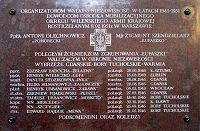
Awards
On Independence DayPolish Independence Day
National Independence Day is a public holiday in Poland celebrated every year on 11 November to commemorate the anniversary of Poland's assumption of independent statehood in 1918 after 123 years of partition by Russia, Prussia and Austria....
11 November 2006, Polish President Lech Kaczyński
Lech Kaczynski
Lech Aleksander Kaczyński was Polish lawyer and politician who served as the President of Poland from 2005 until 2010 and as Mayor of Warsaw from 2002 until 22 December 2005. Before he became a president, he was also a member of the party Prawo i Sprawiedliwość...
posthumously awarded Danuta Siedzikówna the Knight's Cross of the Order of Polonia Restituta
Polonia Restituta
The Order of Polonia Restituta is one of Poland's highest Orders. The Order can be conferred for outstanding achievements in the fields of education, science, sport, culture, art, economics, defense of the country, social work, civil service, or for furthering good relations between countries...
.
Film
In January 2007, a movie about Danuta Siedzikówna last days, "Inka 1946. Ja jedna zginę", featuring actress Karolina Kominek-Skuratowicz in the title role and Natalia Korynckia-Gruz as a producer, was released by TeleplayTeleplay
A teleplay is a television play, a comedy or drama written or adapted for television. The term surfaced during the 1950s with wide usage to distinguish a television plays from stage plays for the theater and screenplays written for films...
.
Patronage
- Park im. sanitariuszki Inki in SopotSopotSopot is a seaside town in Eastern Pomerania on the southern coast of the Baltic Sea in northern Poland, with a population of approximately 40,000....
, - Grammary School in PodjazyPodjazyPodjazy is a village in the administrative district of Gmina Sulęczyno, within Kartuzy County, Pomeranian Voivodeship, in northern Poland. It lies approximately north of Sulęczyno, west of Kartuzy, and west of the regional capital Gdańsk....
, near SulęczynoSuleczynoSulęczyno is a village in Kartuzy County, Pomeranian Voivodeship, in northern Poland. It is the seat of the gmina called Gmina Sulęczyno. It lies approximately west of Kartuzy and west of the regional capital Gdańsk....
in Kartuzy CountyKartuzy CountyKartuzy County is a unit of territorial administration and local government in Pomeranian Voivodeship, northern Poland. It came into being on January 1, 1999, as a result of the Polish local government reforms passed in 1998. Its administrative seat and largest town is Kartuzy, which lies west...
in Pomeranian VoivodeshipPomeranian VoivodeshipPomeranian Voivodeship, or Pomerania Province , is a voivodeship, or province, in north-central Poland. It comprises most of Pomerelia , as well as an area east of the Vistula River... - GymnasiumGymnasium (school)A gymnasium is a type of school providing secondary education in some parts of Europe, comparable to English grammar schools or sixth form colleges and U.S. college preparatory high schools. The word γυμνάσιον was used in Ancient Greece, meaning a locality for both physical and intellectual...
no 2 in Ostrołęka in Masovian VoivodeshipMasovian Voivodeship-Administrative division:Masovian Voivodeship is divided into 42 counties : 5 city counties and 37 "land counties"... - 3 Sokólska Drużyna Wędrownicza ZHP
- 95 Tomaszowska Drużyna Harcerek "SZAROTKA" ZHP belonged to Headquarters Hufiec ZHP in Piotrków TrybunalskiPiotrków TrybunalskiPiotrków Trybunalski is a city in central Poland with 80,738 inhabitants . It is situated in the Łódź Voivodeship , and previously was the capital of Piotrków Voivodeship...
- 1 Ostrołęcka Drużyna Harcerek "Ignis" ZHRZwiazek Harcerstwa RzeczypospolitejZwiązek Harcerstwa Rzeczypospolitej is a Polish Scouting organization founded on February 12, 1989. At present, Związek Harcerstwa Rzeczypospolitej has over 15,000 members...
- 37 GdyńskaGdyniaGdynia is a city in the Pomeranian Voivodeship of Poland and an important seaport of Gdańsk Bay on the south coast of the Baltic Sea.Located in Kashubia in Eastern Pomerania, Gdynia is part of a conurbation with the spa town of Sopot, the city of Gdańsk and suburban communities, which together...
Drużyna Harcerek "Biedronki" ZHRZwiazek Harcerstwa RzeczypospolitejZwiązek Harcerstwa Rzeczypospolitej is a Polish Scouting organization founded on February 12, 1989. At present, Związek Harcerstwa Rzeczypospolitej has over 15,000 members... - 44 Mazowiecka Drużyna Harcerek "Kasjopea" ZHRZwiazek Harcerstwa RzeczypospolitejZwiązek Harcerstwa Rzeczypospolitej is a Polish Scouting organization founded on February 12, 1989. At present, Związek Harcerstwa Rzeczypospolitej has over 15,000 members...
in Warszawy
Memorials
- Memorial plaque in the Marien Basilica, GdańskGdanskGdańsk is a Polish city on the Baltic coast, at the centre of the country's fourth-largest metropolitan area.The city lies on the southern edge of Gdańsk Bay , in a conurbation with the city of Gdynia, spa town of Sopot, and suburban communities, which together form a metropolitan area called the...
- Memorial in Park imienia Sanitariuszki Inki, SopotSopotSopot is a seaside town in Eastern Pomerania on the southern coast of the Baltic Sea in northern Poland, with a population of approximately 40,000....
- Memorial near the parish church, NarewkaNarewkaNarewka is a village in Poland, in Podlaskie Voivodeship, Hajnówka County, Gmina Narewka. It is located near the border with Belarus. Many of the inhabitants belong to the Belarusian minority in Poland.The village has a Catholic and Orthodox churches...
- Symbolical grave at the Garrison Cemetery, GdańskGdanskGdańsk is a Polish city on the Baltic coast, at the centre of the country's fourth-largest metropolitan area.The city lies on the southern edge of Gdańsk Bay , in a conurbation with the city of Gdynia, spa town of Sopot, and suburban communities, which together form a metropolitan area called the...
See also
- Polonia RestitutaPolonia RestitutaThe Order of Polonia Restituta is one of Poland's highest Orders. The Order can be conferred for outstanding achievements in the fields of education, science, sport, culture, art, economics, defense of the country, social work, civil service, or for furthering good relations between countries...
- List of recipients of the Order of Polonia Restituta
- Wrongful executionWrongful executionWrongful execution is a miscarriage of justice occurring when an innocent person is put to death by capital punishment, the "death penalty." Cases of wrongful execution are cited as an argument by the opponents of capital punishment....
- Judicial murderJudicial murderJudicial murder is the unjustified execution of death penalty.The term was first used in 1782 by August Ludwig von Schlözer in reference to the execution of Anna Göldi...
- Cursed soldiersCursed soldiersThe cursed soldiers is a name applied to a variety of Polish resistance movements formed in the later stages of World War II and afterwards. Created by some members of the Polish Secret State, these clandestine organizations continued their armed struggle against the Stalinist government of Poland...

